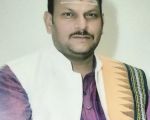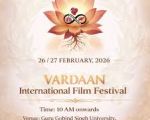The Jaipur Literature Festival, often hailed as the “greatest literary show on Earth,” originated in 2006 in the vibrant Pink City of Jaipur, Rajasthan, India. Co-founded by acclaimed authors Namita Gokhale and historian William Dalrymple, the inaugural event was a modest affair, attracting just about 100 attendees to the historic Diggi Palace. What began as an experiment in celebrating books and ideas has since blossomed into a cultural phenomenon, drawing over 500,000 visitors annually to its five-day extravaganza. Organized by Teamwork Arts in partnership with the Jaipur Virasat Foundation, JLF Jaipur has grown exponentially, shifting venues in 2025 to the more expansive Hotel Clarks Amer to accommodate its scale. The festival’s democratic ethos—no entry fees for general attendance—has made it accessible to all, turning it into a melting pot of over 25 languages, 20 countries, and diverse voices from Nobel laureates to emerging poets.
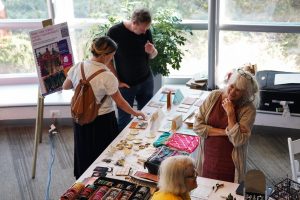
At its core, JLF Jaipur embodies the power of words to transcend boundaries. Sessions span literature, poetry, music, politics, environment, film, theatre, history, and culture, often sparking heated debates and profound reflections. Past editions have featured luminaries like Salman Rushdie, Oprah Winfrey, the Dalai Lama, and Booker Prize winners such as Kiran Desai. The 2018 festival alone boasted over 380 participants representing 20 international and 15 Indian languages, while the 2024 edition reached 35 million viewers through its digital platform amid the COVID-19 challenges. Controversies have not been absent— in 2012, authors like Hari Kunzru read from Salman Rushdie’s banned The Satanic Verses, leading to police involvement—but these moments underscore JLF’s commitment to free expression. As Dalrymple noted in a 2020 reflection, the festival has made literature “aspirational,” pulling books from dusty shelves into public squares and inspiring a new generation of readers across South Asia and beyond.
Teamwork Arts, the powerhouse behind JLF, has been crafting cultural experiences for over 30 years. Founded as India’s pioneering arts company, it produces more than 33 festivals in 45 cities across 19 countries, blending performing arts, visual arts, literature, and knowledge-sharing. Under Managing Director Sanjoy K. Roy, Teamwork has taken Indian talents global while importing international voices to India. From the Mahindra Kabira Festival in Varanasi to the Voices of Faith in London, their portfolio emphasizes empathy, innovation, and heritage. JLF’s international editions, including those in the US, UK, Spain, the Maldives, Australia, and the Middle East, seamlessly merge South Asia’s multilingual traditions with local essences. In the US alone, JLF graces five cities: New York, Houston, Boulder (Colorado), Seattle, and North Carolina. These offshoots, born from the mothership’s indomitable spirit, adapted resiliently during the pandemic with virtual formats like “JLF Brave New World,” amassing millions of views.
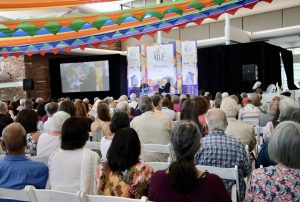
JLF Colorado, launched in 2015, captures this essence in Boulder’s progressive, community-oriented setting. Hosted at the Boulder Public Library (1001 Arapahoe Ave.), the free, open-to-all event has become a staple since its inception, blending the Rockies’ natural beauty with intellectual fervor. Pre-registration is encouraged via Eventbrite to manage crowds, but walk-ins are welcome for one or all sessions. Morning music performances set an invigorating tone, often featuring Indian classical influences, while afternoons buzz with panel discussions, book signings, and provocative dialogues. Over the years, it has hosted over 50 speakers per edition, exploring themes like gender equity, migration, spirituality, and peacebuilding. Partnerships with local entities—the Boulder Arts Commission, National Endowment for the Arts, and Community Foundation of Boulder County—ensure its sustainability, while donations from “Friends of the Festival” support production costs.
This year’s 11th edition builds on that legacy, promising a “vibrant meeting ground where Boulder’s dynamic spirit converges with the world’s literary and cultural voices,” as Roy stated in the announcement. The festival’s highlighted sessions showcase its interdisciplinary flair. Kicking off the intellectual feast is Great Black Hope, where writer and critic Rob Franklin engages with academic Pardis Mahdavi on his debut novel. This gripping narrative weaves queerness, race, class, and grief against the pulsating backdrop of New York City’s nightlife, offering a raw exploration of identity in urban America. Franklin’s work, praised for its unflinching honesty, resonates with contemporary discussions on intersectionality, making it a timely addition to JLF’s roster of diverse narratives.
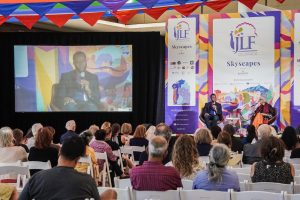
Delving into the intersections of science and creativity, Blueprints: How Mathematics Shapes Creativity features Oxford mathematician Marcus du Sautoy in conversation with Roy himself. Du Sautoy, a celebrated communicator of complex ideas, unpacks how mathematical concepts like symmetry, fractals, and prime numbers have fueled literary, musical, and artistic innovations. Conversely, he argues, creative pursuits can illuminate mathematical mysteries. Drawing from his book The Creativity Code, du Sautoy’s session promises to bridge the often-perceived divide between “left-brain” logic and “right-brain” imagination, inspiring attendees— from STEM enthusiasts to artists—to see patterns in everyday life. This dialogue echoes JLF’s broader mission to democratize knowledge, much like how the main Jaipur festival has hosted sessions on artificial intelligence and speculative fiction.
Gender and evolution take center stage in Ideas of Eve: Evolutionary Feminism, where researcher Cat Bohannon joins academic and novelist Sonora Jha, moderated by historian Patricia Limerick. Bohannon, author of the bestselling Eve: How the Female Body Drove 200 Million Years of Human Evolution, challenges traditional narratives by centering women’s voices and bodies in cultural and scientific histories. Jha, known for her incisive novels on identity and power, adds a literary lens, while Limerick, a pioneer in Western American history, grounds the discussion in regional contexts. Together, they examine how evolutionary insights reshape gender politics in literature, fostering a conversation on resilience and reinvention. This session aligns with JLF’s emphasis on inclusivity, reflecting themes from past editions like banned books and patriarchy.
Rounding out the marquee lineup is Pulitzer Prize-winning novelist Andrew Sean Greer, in conversation with Arsen Kashkashian on Less Is Lost: The Art of Being Out of Place. The sequel to Greer’s 2017 Pulitzer-winning Less, this humorous yet poignant tale follows protagonist Arthur Less on a cross-country American odyssey, grappling with loss, love, and displacement. Greer’s wit and empathy have earned him comparisons to Kafka and Kerouac, and his session will explore the universal discomfort of feeling “out of place” in an increasingly transient world. Kashkashian, a seasoned literary curator, will draw out Greer’s insights on writing through personal and global upheavals.
Beyond these highlights, JLF Colorado 2025 will feature additional sessions on peacebuilding with speakers from Nigeria, Kenya, and Ethiopia; body-mind health; and banned books, ensuring a broad spectrum of topics. Live music every morning, book stalls, and networking opportunities will create an immersive atmosphere, embodying Roy’s vision: “JLF Colorado fosters dialogue that bridges differences, celebrates diversity, and inspires audiences to reflect, connect, and imagine new possibilities.” The Boulder Public Library’s commitment to community and inclusivity amplifies this, transforming the venue into a “global stage” nestled in Colorado’s progressive landscape.
The recent 18th edition of JLF Jaipur in January 2025 was a triumph, captivating on-ground and online audiences with stellar speakers and reaffirming literature’s enduring power. As the caravan of ideas travels onward, JLF USA editions like Colorado continue this legacy, adapting to local vibes while honoring South Asian roots. In Houston, New York, Seattle, and North Carolina, similar events in association with consulates, Asia Society, and museums ignite passions for literature, geopolitics, art, and music. Through virtual innovations during COVID, JLF reached millions, proving its adaptability—from Art Matters empowering Indian artists to Be Inspired fast-tracking scientific narratives.
Teamwork Arts’ broader oeuvre underscores JLF’s impact. Their 2024 additions, like the Jaigarh Heritage Festival celebrating Jaipur’s regal past and Voices of Faith promoting empathy, highlight a holistic approach to culture. With over 2,000 speakers hosted globally and a digital footprint exceeding 35 million views in 2024, Teamwork has made JLF a beacon for changemakers. Roy, an arts entrepreneur honored with degrees from institutions like the University of York, emphasizes collective understanding in a fractured world.
As Boulder gears up for September 13–14, JLF Colorado 2025 invites all to partake in this feast of ideas. Whether you’re a voracious reader, aspiring writer, or curious thinker, the festival offers free entry to sessions that challenge, entertain, and unite. In an era of division, events like JLF remind us that stories are bridges—across borders, backgrounds, and beliefs. For tickets and full programs, visit jlflitfest.org/colorado. The 2026 JLF Jaipur, from January 15–19, awaits, but for now, Colorado’s edition promises to light the path.



